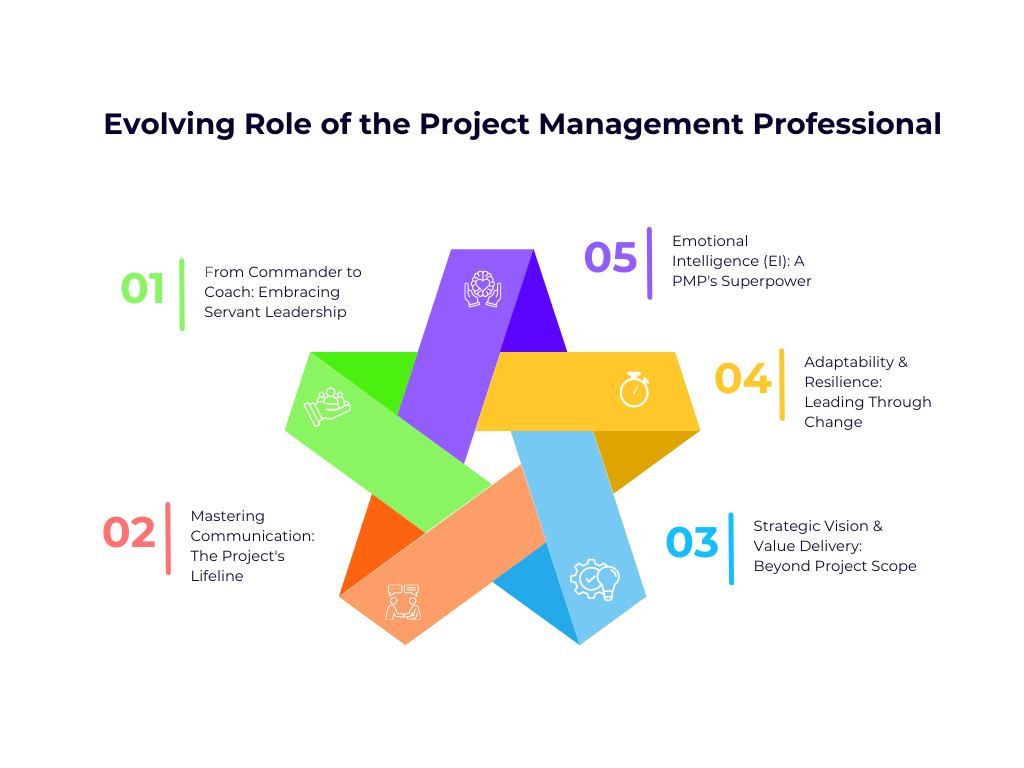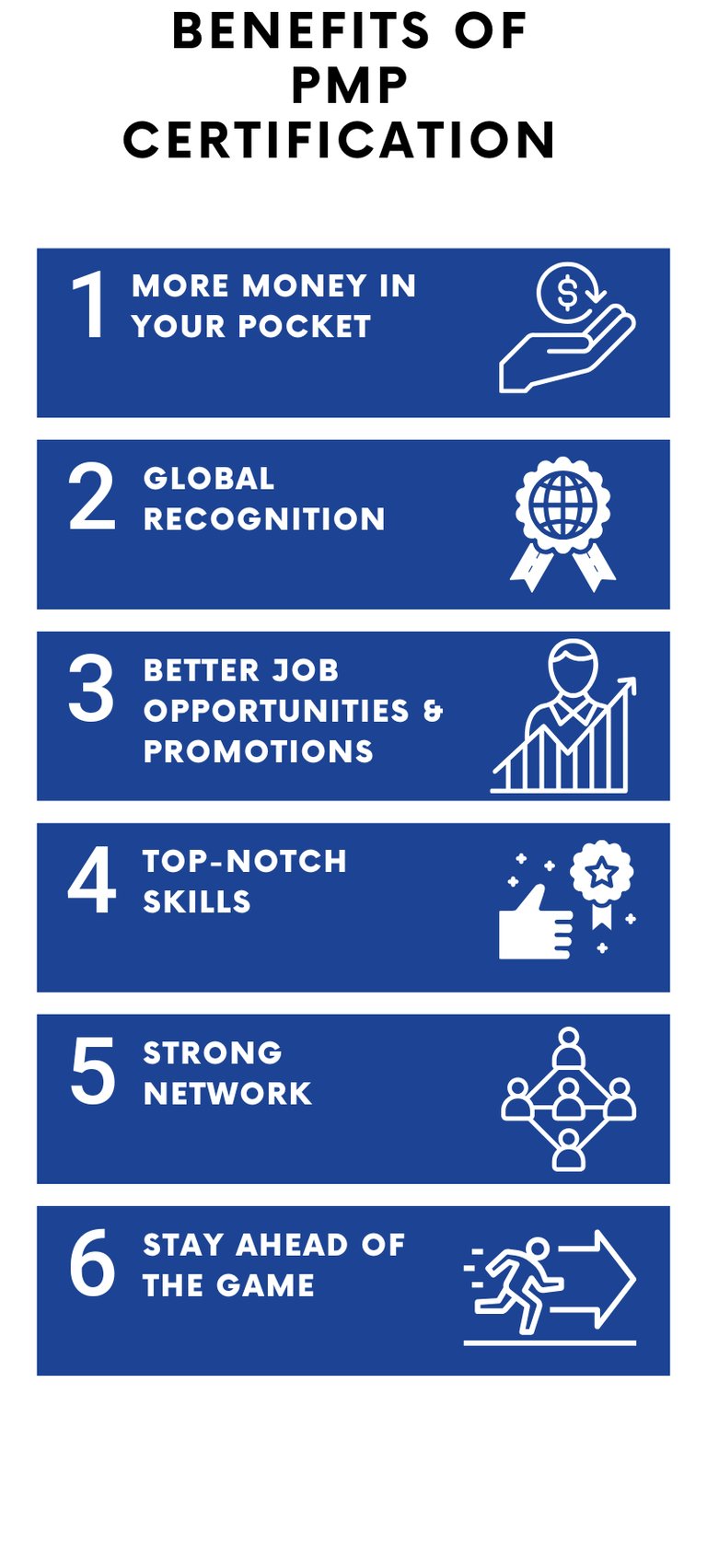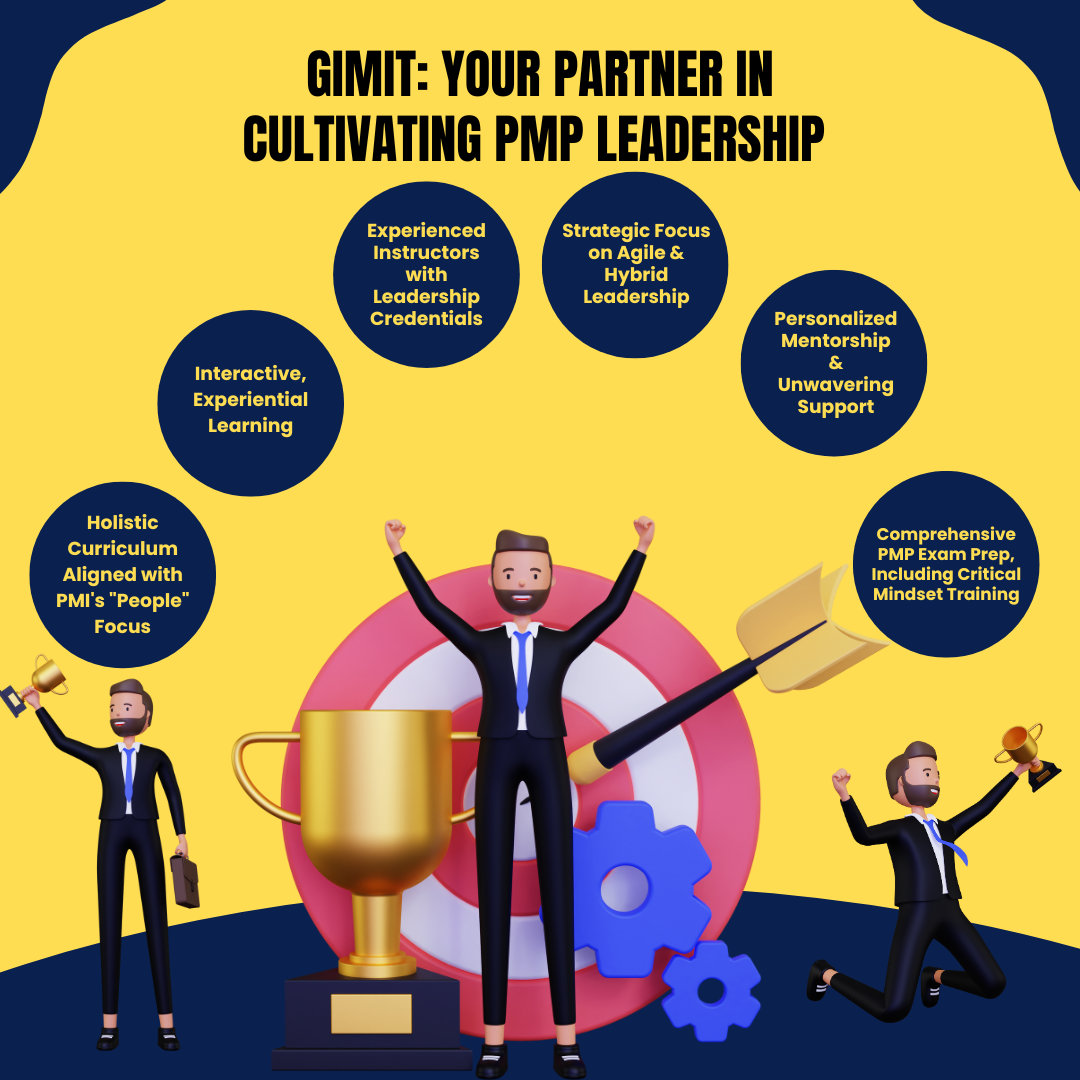PMP Certification in 2025: Why Leadership & Soft Skills are Your Project Management Superpowers
The world of business is moving faster than ever. For any project management professional in India, simply knowing processes isn't enough. The role has fundamentally transformed, demanding leaders who expertly blend technical knowledge with crucial leadership and interpersonal skills – often called "soft skills." This isn't just a trend; it's a core shift, explicitly highlighted by PMI, with a substantial 42% of the PMP® credential exam now focused on the "People" domain. Projects are, at their heart, human endeavors driven by collaboration, communication, and emotional intelligence.
So, if you're looking to elevate your career and secure a globally recognized project management professional certificate, understanding this evolving role is key to your PMP Journey.


The Evolving Role of the Project Management Professional: Beyond the Checklist
What exactly does this expanded role mean for you, an aspiring or current PMP certified professional? It means shifting from a traditional "manager" to a dynamic "leader."
From Commander to Coach: Embracing Servant Leadership: The old top-down approach is out. Modern PMP project management embraces a more supportive, collaborative leadership style. A project management professional now acts as a facilitator, mentor, and coach, empowering their team to excel. This pivotal shift requires:
Active Listening: Going beyond words to truly grasp team members' and stakeholders' motivations and needs.
Empathy: Understanding perspectives, especially during challenging times.
Strategic Delegation & Trust: Confidently assigning tasks while providing unwavering support.
Proactive Impediment Removal: Shielding the team by identifying and clearing obstacles before they escalate.
Constructive Conflict Facilitation: Guiding disagreements toward positive resolutions.
This commitment to team well-being is fundamental to modern project leadership and crucial for excellence.
Mastering Communication: The Project's Lifeline Communication has always been vital, but for today's diverse, global, and often remote project teams, it's essential. A PMP credential holder must be a communication expert:
Clarity & Conciseness: Ensuring messages are unambiguous and easy to understand for all stakeholders.
Tailored Messaging: Adapting communication style to suit various audiences, from executives to technical teams.
Effective Facilitation: Leading productive meetings and workshops that drive consensus and decisions.
Expert Conflict Resolution & Negotiation: Skillfully mediating disputes and achieving mutually beneficial outcomes.
A project management professional acts as the central information hub, ensuring seamless flow and engagement. This is particularly critical in complex fields like project management for IT professionals in India's fast-growing tech sector.
Emotional Intelligence (EI): A PMP's Superpower: Projects are high-pressure environments where human emotions play a significant role. A project management professional with high emotional intelligence (EI) possesses an invaluable advantage. They demonstrate:
Self-Awareness: Understanding their own emotions and their impact on others.
Self-Regulation: Managing impulses and maintaining composure under pressure.
Motivation: Possessing an intrinsic drive, optimism, and resilience.
Empathy: The capacity to understand others' emotional makeup and respond wisely.
Social Skills: Building rapport, influencing positively, and resolving conflicts gracefully.
This ability to connect on a human level fosters trust, strengthens relationships, and is critical for motivating peak team performance, distinguishing a true program management professional.
Adaptability & Resilience: Leading Through Change: The contemporary business environment is marked by constant change (VUCA). Projects are rarely linear. The modern Project Management Professional must be highly adaptable:
Embracing Agility: Shifting from rigid planning to flexible, iterative Agile and Hybrid methodologies.
Leading Through Ambiguity: Guiding the team effectively when information is incomplete or goals evolve.
Creative Problem-Solving: Innovating solutions to unexpected issues.
Stress Management: Managing personal stress while helping the team cope with project pressures.
Commitment to Continuous Learning: Staying abreast of new technologies and methodologies to remain effective.
This means embracing change as an opportunity, equipping the team to pivot quickly and efficiently in the dynamic PMP project management landscape.
Strategic Vision & Value Delivery: Beyond Project Scope: A project management professional no longer simply delivers a project; they are strategic partners focused on creating tangible business value. They:
a) Align Project Goals with Business Objectives: Ensuring initiatives directly contribute to the organization's overarching strategy.
b) Focus on Value Creation: Understanding the profound "why" and relentlessly ensuring measurable business benefits.
c) Engage Senior Leadership: Effectively communicating project status, risks, and benefits to executive sponsors.
d) Navigate Organizational Change: Understanding the impact of projects on culture, processes, and people.
e) Adherence to Governance: Operating seamlessly within organizational structures for compliance and effective decision-making.
This keen business acumen and ability to articulate value are crucial skills for any Program Management Professional Certification holder. In essence, today's Project Management Professional is a multi-faceted leader, a master communicator, an empathetic team builder, a resilient problem-solver, and a strategic business partner. This comprehensive skill set is precisely what the PMP certification aims to validate.
Benefits of PMP Certification Now: Why Your Investment Pays Off in 2025
In today's world, where projects are like complex movie productions, the PMP Project Management Professional Certification is more valuable than ever. It's not just a fancy certificate; it's a stamp of approval that you're ready to direct winning projects.
Here's why getting your PMP credential is a fantastic career move:
More Money in Your Pocket (Especially in India): This is a big one! People with a PMP certification usually earn much more than those without it. Studies show you could earn 20-33% more! So, the PMP certification cost, PMP course cost, or PMP training cost is actually an investment that pays you back quickly and keeps giving. According to PMI's data, PMP holders in India can earn 20-33% more than non-certified peers, with average salaries ranging from ₹7 Lakhs to ₹35.8 Lakhs annually depending on experience and city (e.g., Bengaluru, Mumbai, Delhi).
Global Recognition: The PMP is known and respected worldwide in over 200 countries. It's like having a universal passport for project management jobs. This means you can find exciting opportunities anywhere, making your Project Management Professional Certificate valuable across borders.
Better Job Opportunities & Promotions: Many companies, especially for important project roles, prefer or even require a PMP credential. It makes you stand out from the crowd and helps you get noticed for bigger, better jobs, including Program Management Professional roles. It can truly fast-track your career.
Top-Notch Skills: The PMP Exam Prep process is tough, but it teaches you the latest and best ways to manage projects, including Agile and Hybrid methods. This means you'll be equipped with practical skills to handle any project, big or small, making you a highly capable Project Management Professional.
Strong Network: When you become PMP certified, you join a huge global community of other project managers. This is a great way to meet new people, learn from their experiences, and find mentors. It's a powerful network that can open doors and help you grow throughout your career.
Stay Ahead of the Game: The PMP is always updated to reflect the newest trends, like Agile project management and even how AI impacts projects. This means your certification keeps you current and ready for future challenges in PMP project management. It shows you're committed to staying on top.
What about the cost? While the Project Management Professional (PMP) Certification cost involves exam fees (e.g., in India, around ₹24,708 for PMI members and ₹50,025 for non-members, as of July 2025), plus training and study materials, remember it's an investment in your future earning power and career growth. The PMP certification prerequisites include having certain project experience (e.g., 36 months if you have a four-year degree, plus 35 hours of project management education).
While a Google Project Management Certification offers a foundational understanding, the PMP credential remains the globally recognized gold standard for serious project leaders.
Benefits of PMP Certification Now: Why Your Investment Pays Off in 2025
In today's world, where projects are like complex movie productions, the PMP Project Management Professional Certification is more valuable than ever. It's not just a fancy certificate; it's a stamp of approval that you're ready to direct winning projects.
Here's why getting your PMP credential is a fantastic career move:
More Money in Your Pocket (Especially in India): This is a big one! People with a PMP certification usually earn much more than those without it. Studies show you could earn 20-33% more! So, the PMP certification cost, PMP course cost, or PMP training cost is actually an investment that pays you back quickly and keeps giving. According to PMI's data, PMP holders in India can earn 20-33% more than non-certified peers, with average salaries ranging from ₹7 Lakhs to ₹35.8 Lakhs annually depending on experience and city (e.g., Bengaluru, Mumbai, Delhi).
Global Recognition: The PMP is known and respected worldwide in over 200 countries. It's like having a universal passport for project management jobs. This means you can find exciting opportunities anywhere, making your Project Management Professional Certificate valuable across borders.
Better Job Opportunities & Promotions: Many companies, especially for important project roles, prefer or even require a PMP credential. It makes you stand out from the crowd and helps you get noticed for bigger, better jobs, including Program Management Professional roles. It can truly fast-track your career.
Top-Notch Skills: The PMP Exam Prep process is tough, but it teaches you the latest and best ways to manage projects, including Agile and Hybrid methods. This means you'll be equipped with practical skills to handle any project, big or small, making you a highly capable Project Management Professional.
Strong Network: When you become PMP certified, you join a huge global community of other project managers. This is a great way to meet new people, learn from their experiences, and find mentors. It's a powerful network that can open doors and help you grow throughout your career.
Stay Ahead of the Game: The PMP is always updated to reflect the newest trends, like Agile project management and even how AI impacts projects. This means your certification keeps you current and ready for future challenges in PMP project management. It shows you're committed to staying on top.
What about the cost? While the Project Management Professional (PMP) Certification cost involves exam fees (e.g., in India, around ₹24,708 for PMI members and ₹50,025 for non-members, as of July 2025), plus training and study materials, remember it's an investment in your future earning power and career growth. The PMP certification prerequisites include having certain project experience (e.g., 36 months if you have a four-year degree, plus 35 hours of project management education).
While a Google Project Management Certification offers a foundational understanding, the PMP credential remains the globally recognized gold standard for serious project leaders.




GIMIT: Your Partner in Cultivating PMP Leadership & Soft Skills
At GIMIT, we understand the paramount importance of leadership and soft skills in today's project management landscape. Our PMP training and certification programs are meticulously designed to empower aspiring and seasoned Project Management Professional Certification course candidates. We go far beyond simply teaching project management processes; we are dedicated to cultivating the essential "people skills" that differentiate a good project manager from a great one.
Here’s how GIMIT plays a pivotal role in preparing you not just for the challenging PMP Exam prep but for a thriving career as an impactful project leader:
Holistic Curriculum Aligned with PMI's "People" Focus: GIMIT's Project Management Professional course curriculum is continuously updated to reflect the latest PMI Exam Content Outline, with a strong emphasis on the "People" domain. Our modules delve deep into:
Leading & Empowering a Project Team
Building High-Performing Teams
Managing Conflict & Removing Impediments
Effective Stakeholder Collaboration & Communication
Mentoring & Coaching Team Members
Applying Emotional Intelligence for Enhanced Performance
Interactive, Experiential Learning: We believe leadership skills are developed through practice. GIMIT employs highly interactive exercises, realistic case studies, and engaging role-playing scenarios. This provides invaluable opportunities to practice communication, negotiation, conflict resolution, and leadership abilities in a safe, simulated environment, setting our PMP course apart.
Experienced Instructors with Leadership Credentials: Our trainers are not just PMP certified; they are seasoned practitioners with extensive hands-on experience in leading diverse teams and navigating real-world challenges. They share practical insights that go beyond theoretical concepts in every Project Management Professional training session.
Strategic Focus on Agile & Hybrid Leadership: With the PMP Project Management Professional Exam's significant emphasis on Agile and Hybrid, GIMIT ensures you understand both the technical aspects and how leadership and soft skills apply in these dynamic environments. We equip you with the mindset and tools to foster self-organizing teams and lead through constant change.
Personalized Mentorship & Unwavering Support: At GIMIT, we are committed to your individual success. Our PMP course and certification programs often include personalized mentorship, offering one-on-one coaching to strengthen your leadership presence, communication style, and strategic thinking. We support you from your initial application, through meeting the PMP certification prerequisites, right up to your certification.
Comprehensive PMP Exam Prep, Including Critical Mindset Training: While our focus on soft skills is strong, GIMIT ensures rigorous technical preparation for the PMP exam. We provide robust study materials, extensive practice questions, and realistic mock exams. Crucially, we also train you in the "servant leadership" and "agile mindset" expected by PMI, maximizing your chances of passing on your first attempt and achieving that pmp pmp certification.
Considering the PMP certification cost, PMP course cost, or PMP training cost can be a significant investment. However, with GIMIT, you're not just paying a PMP cert cost; you're investing in a profound, transformative journey. This journey will equip you with the essential leadership and soft skills that are not just desired but demanded by today's evolving project management landscape, propelling you towards becoming a truly effective, influential, and sought-after project management professional. Join GIMIT to unlock your full potential and shape the future of PMP project management.
Conclusion: PMP – Your Key to Leadership and Growth in India
In 2025, the PMP credential is paramount for any aspiring project management professional. It signifies not just process expertise, but crucial leadership and soft skills. For professionals in India, the PMP certification offers a tangible advantage: higher salaries (up to 33% more) and significant career opportunities in booming sectors like IT and infrastructure.
Despite the PMP certification cost (exam fee around ₹23,459 for PMI members), the investment yields substantial returns. Institutes like GIMIT provide essential PMP training to meet prerequisites and master the skills needed for the challenging PMP Exam prep.
Don't just get certified; become a strategic, influential Program Management Professional. The PMP certification is your gateway to leading impactful projects and advancing your career in India's dynamic economy.
Frequently asked questions
Q1: Is the PMP Certification still worth it in India in 2025? A: Absolutely! The PMP Project Management Professional Certification is more relevant than ever. It's the globally recognized gold standard for project managers. In India, it opens doors to higher salaries, enhanced credibility, and a wider range of job opportunities in booming sectors like IT, construction, and finance, making the PMP cert cost a worthwhile investment.
Q2: What is the average salary increase for PMP certified professionals in India? A: According to PMI data, PMP certified professionals in India can earn 20-33% more than their non-certified counterparts. Average annual salaries for PMP holders in India typically range from ₹7 Lakhs to ₹35.8 Lakhs, with a median around ₹16.3 Lakhs, depending on experience, city (e.g., Bengaluru offers higher), and industry.
Q3: What are the PMP certification prerequisites in India? A: To be eligible for the PMP exam, you generally need:
With a four-year degree: 36 months (3 years) of unique, non-overlapping project management experience, plus 35 hours of project management education/training.
With a secondary diploma/associate's degree: 60 months (5 years) of unique, non-overlapping project management experience, plus 35 hours of project management education/training. These 35 hours can be obtained through a PMP course or project management professional training from an Authorized Training Partner like GIMIT.
Q4: How much does PMP certification cost in India in 2025? A: The project management professional PMP certification cost for the exam (as of early 2025) is approximately:
₹24,708 for PMI members.
₹50,025 for non-PMI members. Remember, this is the exam fee. You'll also incur PMP course cost or PMP training cost for the mandatory 35 hours of education, and potentially PMI membership fees (approx. ₹9,963 annually in India), which offer a discount on the exam fee and access to resources.
Q5: What kind of job opportunities are available for PMP certified professionals in India? A: PMP certified professionals are in high demand across diverse industries in India. Key sectors include:
Information Technology (IT): Extensive opportunities for project management for IT professionals in software development, digital transformation, and cybersecurity.
Construction & Infrastructure: Leading large-scale projects, smart cities, and real estate development.
Finance & Banking: Managing complex regulatory projects and digital initiatives.
Healthcare & Pharmaceuticals: Overseeing new healthcare technologies, facilities, and compliance projects.
Manufacturing, Energy, and E-commerce. Many senior project management professional roles and program management professional positions explicitly require the PMP credential.
Q6: How has the PMP exam changed to reflect the importance of soft skills? A: The PMP Project Management Professional Exam content outline dedicates a significant 42% of its focus to the "People" domain. This means the exam heavily tests your understanding and application of soft skills like leadership, communication, emotional intelligence, conflict resolution, team building, and stakeholder engagement. Questions are often scenario-based, requiring you to demonstrate a "servant leadership" and "Agile mindset."
Q7: How does a PMP certification compare to a Google Project Management Certification? A: While the Google Project Management Certification provides a foundational understanding of project management principles, the PMP credential is recognized as the global gold standard for experienced project managers. The PMP validates a higher level of experience, knowledge, and leadership capabilities across various methodologies (predictive, Agile, hybrid), making it more suitable for those aiming for senior or complex project management professional roles.
Q8: What kind of PMP exam prep does GIMIT offer to develop leadership and soft skills? A: GIMIT's project management professional course goes beyond technical processes. Their PMP training emphasizes the "People" domain through:
Holistic curriculum aligned with PMI's latest outline.
Interactive exercises, real-world case studies, and role-playing scenarios.
Experienced instructors with practical leadership experience.
Strategic focus on Agile and Hybrid leadership.
Personalized mentorship and support to refine communication, negotiation, and conflict resolution skills.
Q9: What is the validity period of the PMP certification? A: The PMP certification is valid for three years. To maintain your PMP credential, you need to earn 60 Professional Development Units (PDUs) every three years through continuous learning, contributing to the profession, or giving back to the community. There's also a renewal fee (lower for PMI members).

